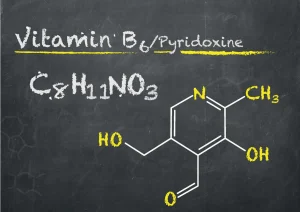VITAMIN B6
VITAMIN B6

What is vitamin B6?
Vitamin B6, also known as pyridoxine, is a water-soluble vitamin that is essential for various metabolic processes in the body. It plays a key role in converting food into energy, supporting the proper functioning of the nervous system, and aiding in the synthesis of neurotransmitters that regulate mood and cognitive function.
Vitamin B6 is involved in the production of red blood cells, supports immune system function, and contributes to the maintenance of healthy skin, hair, and eyes.
Numerous studies have highlighted the potential benefits of vitamin B6, or pyridoxine, in various health conditions. A study found that vitamin B6 supplementation reduced PMS symptoms by 69% in women. Another study demonstrated that combining vitamin B6 with ginger effectively reduced nausea and vomiting in pregnant women.
Furthermore, the relationship between pyridoxal 5'-phosphate (PLP), the active form of vitamin B6, and inflammation suggests its involvement in inflammatory diseases. Additionally, the use of pyridoxamine, a form of vitamin B6, has shown promise in metabolic disease treatment. The administration of intravenous pyridoxine has also been effective in stopping seizures. These findings support the crucial role of vitamin B6 in maintaining optimal health in various bodily systems.
Vitamins or minerals that enhance the absorption of vitamin B6 include:
- Magnesium: Magnesium is involved in the conversion of vitamin B6 to its active coenzyme forms, which are necessary for various enzymatic reactions in the body. Adequate magnesium levels can enhance vitamin B6 function.
- Zinc: Zinc is another mineral that can interact with vitamin B6 metabolism. It is involved in the metabolism and utilisation of B-vitamins, including vitamin B6.
- Riboflavin (Vitamin B2): Riboflavin is essential for the conversion of vitamin B6 to its active forms. Ensuring an adequate intake of riboflavin can support vitamin B6 utilisation.
- Folate (Vitamin B9): Folate is involved in various metabolic processes, including those related to vitamin B6. Adequate folate levels can indirectly support vitamin B6 function.
- Vitamin B12: Vitamin B12 interacts with various B-vitamins, including vitamin B6, and can support their metabolic functions.
Some drugs may interfere with the body's ability to absorb or metabolize biotin properly. Here are some medications that can potentially interact with biotin:
- Carbamazepine: Carbamazepine may reduce biotin levels in the body, potentially leading to biotin deficiency.
- Cycloserine: Cycloserine is an antibiotic that may interfere with the absorption of biotin.
- Erythropoietin: Erythropoietin, a medication used to stimulate red blood cell production, can affect biotin metabolism.
- Levodopa: Levodopa is a medication used to treat Parkinson's disease, and it may impact biotin utilisation.
- Nortriptyline: Nortriptyline is a tricyclic antidepressant that may affect biotin levels in the body.
- Phenytoin: Phenytoin, an anticonvulsant medication, may interfere with biotin metabolism.
- Tetracycline: Tetracycline antibiotics can potentially reduce the absorption of biotin when taken together.
- Theophylline: Theophylline, a medication used to treat respiratory conditions, may interact with biotin metabolism.
- Valproic Acid: Valproic acid, an anticonvulsant medication, can affect biotin levels in the body.
Recommended Products
DIVE DEEPER
How much does the body need per day?
Age |
Male |
Female |
|---|---|---|
|
1 to 3 years: |
0.5mg |
0.5mg |
|
4 to 8 years: |
0.6mg |
0.6mg |
|
9 to 13 years: |
1.0mg |
1.0mg |
|
14 to 18 years old: |
1.3mg |
1.3mg |
|
19 to 50 years: |
1.3mg |
1.3mg |
|
51 years and over: |
1.7mg |
1.7mg |
|
During pregnancy: |
|
1.9mg |
|
Lactation |
|
2mg |












